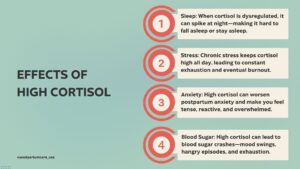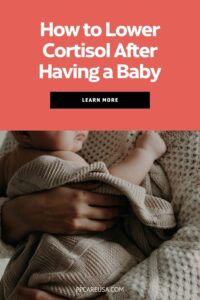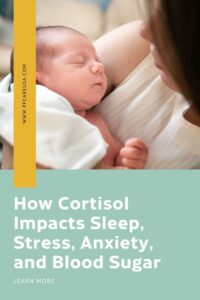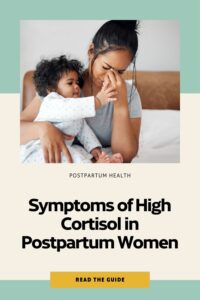When you’re deep in the postpartum season—running on broken sleep, grabbing cold coffee, juggling tiny humans—it’s easy to feel like your body is in survival mode. And honestly? It is.
One of the biggest behind-the-scenes players in all of this? Cortisol, your body’s main stress hormone.
Today, we’re unpacking everything you need to know about postpartum cortisol levels—how they impact your body, mood, metabolism, and even your healing journey. Plus, we’ll talk about how to lower cortisol postpartum naturally and start feeling more like yourself again.
Let’s walk through it together, mama.
What Is Cortisol—and Why Should You Care?
Cortisol is a hormone released by your adrenal glands in response to stress. Think of it as your body’s built-in alarm system: it helps regulate your blood sugar, blood pressure, energy, immune system, and even your sleep cycle (Source).
In small doses, cortisol is life-saving. But when it stays elevated for too long (hello, sleep deprivation and postpartum stress!), it starts working against you instead of for you.
Symptoms of High Cortisol in Females (Especially Postpartum)
Wondering if high cortisol could be part of your postpartum struggles?
Here are some symptoms of high cortisol in females to watch for:
- Fatigue (but wired at night)
- Anxiety or racing thoughts
- Trouble falling asleep or staying asleep
- Weight gain, especially around the midsection
- Sugar cravings
- Irritability and mood swings
- Brain fog
- Increased infections or poor immune response
- Feeling “tired but wired” constantly
Symptoms of high cortisol in postpartum women can often mimic (or worsen) postpartum depletion, anxiety, or thyroid issues—so it’s important not to brush them off.
Cortisol and Belly Fat, Weight Gain, and Weight Loss After Birth
One of the most frustrating things postpartum women report is stubborn belly fat, weight gain, or difficulty losing weight—even when they’re eating healthy and moving their body.
Here’s the science behind it: cortisol and belly fat are closely linked. When cortisol levels stay high for long periods, your body stores more fat around your midsection as a protective response.
High cortisol also messes with your blood sugar regulation, leading to more cravings (especially for sugar and carbs) and making weight loss harder.
In other words: if your stress hormones are out of balance, your metabolism will be too. It’s not just about calories—it’s about healing the stress that’s driving the imbalance.
How Cortisol Impacts Sleep, Stress, Anxiety, and Blood Sugar
Cortisol isn’t just about feeling “stressed out” — it plays a role in nearly every system of your body. And after having a baby, your body’s relationship with cortisol can get seriously out of balance.
When cortisol is high (or swings up and down all day), it doesn’t just affect your mood. It impacts your sleep, your blood sugar, your ability to cope with stress, and even your anxiety levels. Here’s how it all connects:
-
Cortisol and Sleep
Normally, cortisol spikes in the morning to wake you up (called the Cortisol Awakening Response). But when cortisol is dysregulated, it can spike at night instead—making it hard to fall asleep or stay asleep.
-
Cortisol and Stress
Chronic stress keeps cortisol high all day, leading to constant exhaustion and eventual burnout.
-
Cortisol and Anxiety
Elevated cortisol keeps your nervous system in “fight or flight” mode, making postpartum anxiety worse and keeping your body feeling tense, reactive, and overwhelmed.
-
Cortisol and Blood Sugar
High cortisol raises blood sugar, which leads to blood sugar crashes—hello, mood swings, hangry episodes, and exhaustion.

Postpartum Cortisol Levels: Why They’re So Tricky
After you deliver your placenta, your hormone levels—especially estrogen, progesterone, and cortisol—take a massive hit. Ideally, your cortisol would naturally reset to a healthier rhythm postpartum.
But for many women (especially if you’re sleep-deprived, nutrient-depleted, or under chronic stress), cortisol levels stay elevated for much longer than they should.
When this happens, you can feel like you’re stuck in survival mode—wired, anxious, exhausted—for months or even years after giving birth. It’s a huge reason why so many mamas feel “off” without being able to pinpoint exactly why.
If you’re feeling symptomatic (think: poor sleep, mood swings, anxiety, stubborn weight gain, intense sugar cravings), it’s worth checking your cortisol levels postpartum.
The good news? When you catch dysregulated cortisol early, targeted lifestyle changes, nutrition support, and gentle nervous system work can make a massive difference in how you feel—and help you finally get out of survival mode.
High Cortisol Meaning and Causes
When we talk about “high cortisol,” we mean your body is stuck producing too much of this stress hormone, even when you’re not in immediate danger.
High cortisol causes include:
- Chronic sleep deprivation
- Physical stress from labor and delivery
- Emotional trauma or unresolved birth experiences
- Postnatal depletion (nutrient deficiencies)
- Blood sugar imbalances
- Too much caffeine
- Poor gut health
- Constant stimulation (screens, phones, social media)
High Cortisol Treatment: How to Lower Cortisol Postpartum
Here’s the good news: high cortisol treatment doesn’t always require medication. In fact, most of the work happens through simple, consistent lifestyle changes that tell your body: It’s safe now. You can heal.
Here’s how to start:
1. Prioritize Blood Sugar Balance
- Eat within an hour of waking (protein + healthy fats + fiber)
- Avoid skipping meals
- Limit refined carbs and sugary snacks
2. Nourish Your Body with Cortisol-Supportive Nutrients
- Magnesium (leafy greens, pumpkin seeds, dark chocolate)
- Vitamin C (citrus, strawberries, bell peppers)
- B Vitamins (eggs, leafy greens, salmon)
- Electrolytes (sodium, potassium, magnesium) through adrenal cocktails
3. Focus on Sleep Hygiene
- Get morning sunlight to reset your circadian rhythm
- Create a calming nighttime routine (no phones/screens 1 hour before bed)
- Try an Epsom salt bath or magnesium lotion at night
4. Calm Your Nervous System Daily
- Deep belly breathing
- Prayer, gratitude journaling, or meditation
- Gentle stretching, slow walks in nature
- Limit caffeine, especially after noon
5. Address Gut Health
Since cortisol and gut health are so connected, work on repairing your gut lining (think: probiotic foods like yogurt, sauerkraut, and bone broth).
Healing Cortisol After Birth
Mama, if you’ve been feeling “off” and you can’t explain it—please hear this: It’s not just in your head.
Your postpartum cortisol levels may be driving many of the symptoms you’re experiencing: the weight changes, the anxiety, the exhaustion.
With the right support, with small but powerful daily steps, your body can heal.
Healing cortisol postpartum isn’t about hustling harder—it’s about slowing down, nourishing yourself, and giving your body the permission it needs to rest, recover, and rebuild.
You were never meant to do this alone. And you don’t have to.
If you think your cortisol might be out of balance, we’re here to help! At Postpartum Care USA, we specialize in postpartum healing from the inside out—including full lab testing for cortisol, blood sugar, thyroid, and nutrient levels.
Reach out if you’re ready to start feeling like you again.
Pin This for Later:



Postnatal Depletion
Meet the Team
Our Services
Supplements
A virtual healthcare clinic that helps postpartum mamas recover from postnatal depletion syndrome with a holistic approach.

Get in touch